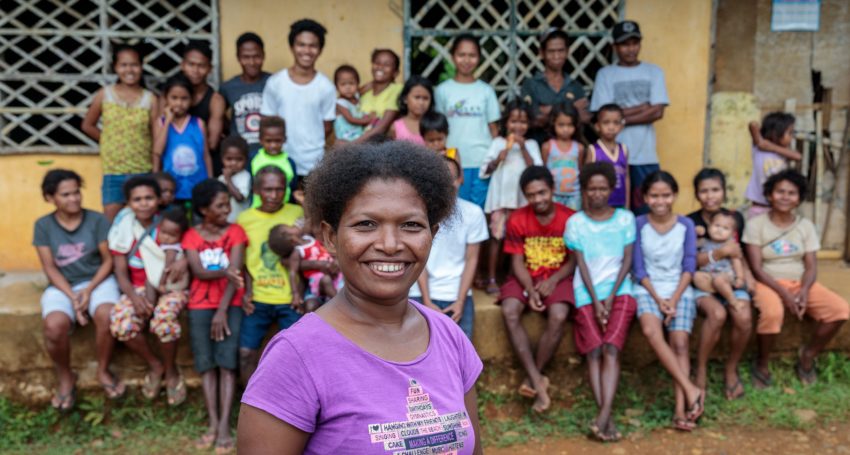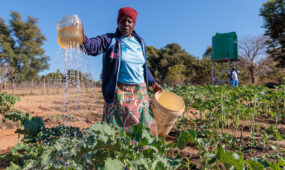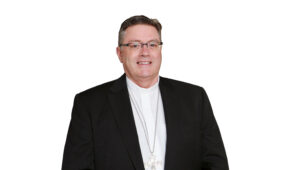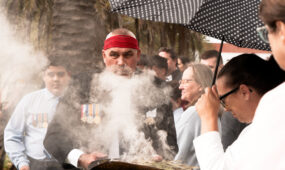Project Compassion transforming lives
News
Shirley, 36, is a Manide indigenous woman living in the remote Camarines Norte province in the Philippines. She is the mother of four and the family’s sole breadwinner, as her husband is sick. But Shirley was struggling to support the whole family and keep her children in school.

Indigenous minorities in the Philippines face regular discrimination and disadvantage, limiting their access to education, employment and healthcare. But thanks to Caritas Australia’s Supporters, as a newly trained indigenous health worker, Shirley’s life has been transformed. She is now leading her community to take a stand against discrimination, improve health and education, and pave the way for a better future.
Shirley lives with her husband, who has tuberculosis, and her four children, aged 6 to 17. Needing to support the family, she collected materials in the forests to make slippers out of dried banana bark that the community would then sell.
Advertisement
She received little education growing up. A member of the traditionally-nomadic Manide tribe, her parents moved around, finding occasional work cultivating rice and other crops. Shirley went to school when she could, but eventually left early in high school.
Despite being a middle-income country, around 2.8 million children in the Philippines do not go to school. Life is incredibly tough for the country’s nearly 17 million indigenous people, who face discrimination and displacement from ancestral lands. They are also often bullied at school, which forces many children to leave school early.
“We didn’t participate in any community activities because we were ashamed to mingle with them. We were afraid to be bullied and experienced discrimination,” Shirley says.
Unequal access to health services also means that many indigenous children and families cannot access basic medical care. Preventable diseases, such as tuberculosis, dengue fever and measles are common among their community, and there is a high maternal and new-born mortality rate. Twenty eight out of every 1000 babies die before their fifth birthday.
Adding to these challenges, Shirley lives in a disaster-prone area. Around 20 typhoons lash the Philippines each year and in 2018, Tropical Cyclone Usman struck her town. Heavy rains destroyed the vegetables she had grown to eat, and she was left with almost nothing.
With Caritas Australia’s support, Shirley trained to become an indigenous health worker and learnt to supplement her income by growing vegetables. Shirley now lives in a government-supplied house and grows more than enough produce to feed her family. She sells the rest of her harvest for extra income. The program has also helped Shirley’s children with school fees, uniforms and supplies.
Shirley recently took over her father’s role as tribal chieftain and represents her people on the Municipal Health Board. As a leader in her community, she helps Manide people access medicines, vaccines, healthcare and nutritional advice. Not only has she improved her own life, she is leading her community to create change for future generations.
“I became the voice of my tribe to have their needs heard,” Shirley says. “As a trained health worker, I am confident to talk, to mingle with non-indigenous people, even with government employees.”
Advertisement
SPACFI’s Community Development Worker, Eric Encinas, says fewer children are now sick and malnourished, and more are going to school due to greater acceptance of the Manide people.
“To have Shirley as a representative for indigenous people gives courage to the community,” said Mr Encinas. “The most significant change in this community is the affirmation of their right to be heard, right to education, right to participate in community activities.”
Shirley says there’s still a long way to go to fight for better employment opportunities and to reduce discrimination but together, they’ll get there.
“I am proud of what I have done for my tribe,” Shirley says. “My dream is to be able to provide for my kids and have them finish their studies…I am so happy and grateful for all the help of Caritas Australia. I hope and pray to continue their assistance, particularly to the needs of indigenous people.”
To donate to Project Compassion visit Caritas Australia’s website www.caritas.org.au/projectcompassion or call 1800 024 413.







Comments
Show comments Hide comments